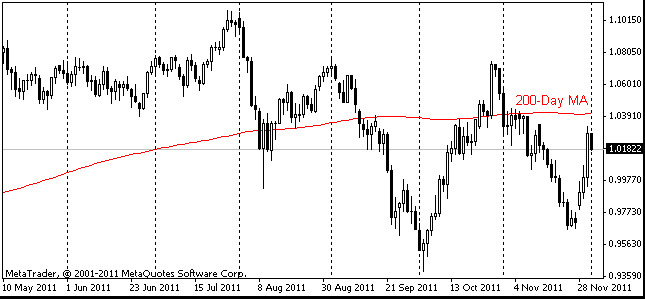EUR/usd
It's not a sure thing but the chiefs of the central banks and the heads of the governments seem to have come to understanding of each other at last. The former are ready to take more drastic measures, while the latter are looking to more balanced budgets. Of course, they will do one in exchange for another. That vicious spiral (economic downturn – rising budget deficits – tightened credit terms – economic downturn) is very likely to break. On Wednesday we witnessed coordinated actions of the Central Banks. And on Thursday we heatedly discussed Mario Monti's revelation of the ECB's intention to act more decisively to resolve the crisis in case a strict fiscal discipline was maintained. It is a promising premise which may turn into reality in a week, on 9 December, when the next EU summit will be held. This is a good sign for Europe and all the European markets are likely to live the whole coming week with the hope for these actions which may support the demand for the euro. Later in the day data on the labor market will be published. They are likely to be favourable (unofficial statistics from ADP showed an increase of 206 thousand in November), however the weekly initial unemployment claims released yesterday are causing some anxiety. They went up from 396K to 402K with expectations of falling to 390K. Now the markets are standing still in anticipation of payrolls, quotes are almost not changing. Yesterday EUR/USD unsuccessfully attempted to break above 1.35, and now the pair is reluctantly moving in a slightly upward trend, being traded at 1.3470 against the previous day rate of 1.3440.

GBP/USD
There are two types of central bankers. Some, like Greenspan and Trichet, prefer to speak vaguely, fogging the truth even when the actions are clear-cut. Others, on the contrary, try to be candid and straightforward. The second type especially appeals to analysts and traders. Undoubtedly, M. King, Governor of the Bank of England, belongs to the second type. Presenting the biannual report on financial stability yesterday, he clearly identified the problems faced by the Euro-Zone at the moment. As he justly put it this is a crisis of solvency (which can't be resolved by lowering of the ECB rates). He said that the Bank and the government were working out a plan of behaviour in case of the unfavourable turn of events on the Continent. He also mentioned that the banks were facing a systemic crisis and that the prospects of Britain's financial stability had significantly decreased. The sterling markets mostly ignored these words and continued to move in a narrow range. But this range, in contrast to the euro, was slightly downward. GBP/USD is now being traded near 1.5680 against the previous day rate of 1.5695. Earlier, during the period of recession in Britain, King made speeches which frequently contributed to reducing of the pound rate, because he considered the lower rate to be beneficial for the country's economy despite the fact that it led to the increase in the inflation rate. Now as Britain CPI is slowing down, King is again sure to call on to lowering of the exchange rate and to active money printing through QE – the measures that will reduce the rate of the sterling.

USD/JPY
As has been previously mentioned, despite the weakening of the dollar, the stock market rise stimulates buying of USD/JPY making the pair look more attractive. In the 4-hour charts that currency's rate makes up a straight row of candles in a narrow upward range, having already played back about 61.8% (from 78.13 to 77.30) of the move on the central banks' news. Now usdjpy is being traded at 78. Give the markets a chance to grow, and you'll see the usd/yen go much higher.

AUD/USD
A day before there were rumors that S&P was going to lower the ratings of four major Australian banks on the review of the risks to the Asian financial system. Those rumors turned out to be true. However, it did not prevent stocks of these companies from closing the day with a profit as despite this reduction they occurred at the same level with the major world's banks. Thanks to quite a conservative approach Australia wasn't affected by the credit crunch and financial problems of the European and U.S. companies in 2007-09 as well as it is not now. The Australian currency was corrected from 1.0280 to 1.0140 yesterday, but managed to end the day above 1.02, where it continues to be traded now. On the whole we are quite optimistic about aussie in spite of the risk that Asia, particularly China, will face a hard landing, which is not favourable for the Australian economy.
